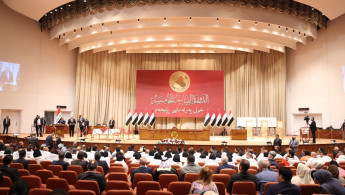A lack of quorum may block Iraqi president and PM nominations on Saturday: source
An Iraqi parliament session scheduled for Saturday to elect a president and assign a prime minister may be blocked by a lack of quorum as a loose alliance of pro-Iran Shiite, Kurdish, and several independent lawmakers are planning a boycott, a source close to the Iraqi politicians in Baghdad told The New Arab on Wednesday.
The tripartite alliance among the Sadrist bloc headed by Shiite cleric Muqtada al-Sadr, Masaud Barzani's the Kurdistan Democratic Party (KDP) faction, and the Sunni Sovereignty Alliance headed by Khamis al-Khanjar announced late Wednesday a new pact titled "Rescue Alliance" and unveiled their nominations for the presidency and premiership.
In a live press conference aired by Iraq's state television, the alliance nominated Reber Ahmed, a Kurd from the KDP for the Iraqi presidency, and nominated Iraq's current ambassador to the United Kingdom, Mohammad Jaafar al-Sadr for the position of prime minister. The latter is Muqtada's cousin and son of the revered Shiite leader Sayeed Mohammad Baqir al-Sadr.
Muqtada al-Sadr later on described in a tweet the alliance as "the biggest bloc" and a "milestone towards forming a national majority government without delay".
On his part, Mohammad Jaafer al-Sadr said in a tweet that he is "honoured" to be nominated by the alliance. "Let us work together to restore the state that is the ambition of all sons of my beloved country," he wrote.
According to Iraq's constitution, a parliamentary bloc with the biggest number of lawmakers is entitled to name a prime minister, who has the most powers within the country's governing system.
Ahmed will be competing against the incumbent president, Barham Salih, also a Kurd from the Patriotic Union of Kurdistan (PUK), who hopes to win a second term.
"The Coordination Framework, a pro-Iran Shiite parliamentary faction that includes more than 100 MPs, PUK's fraction, another Kurdish faction, and a number of independent lawmakers will boycott Saturday's session and thus the legal quorum of 220 MPs out of 320 will not be met," a well-informed close source to the Iraqi political elites in Baghdad told The New Arab on Wednesday.
"The pro-Iran Shiites bloc is not against the nomination of Mohammad Jaafar al-Sadr to run for Iraq's premiership, but the issue is that they emphasise he should be a nominee by the entire Shiite community and not just a Sadrist's nominee."
The source added that KDP's Ahmed is likely to "not be able to win over Salih, and the same scenario of 2018 will happen." The source was referring to the rivalry between the KDP and PUK in 2018 when KDP's then-nominee and Iraq's current foreign minister Foad Husain failed to win over Salih at the parliament.
According to the constitution, a two-thirds majority in the Iraqi parliament is needed to elect the country’s president.
Moreover, Sadr on Tuesday in a tweet urged the independent lawmakers to attend Saturday's session and complete the quorum. But his call is expected not to be heeded.
"All our nine lawmakers in the Iraqi parliament will attend Saturday's session and we will not be a part of those who want to cripple the parliament," Himdad Shahin, spokesperson of the New Generation Kurdish opposition party told The New Arab during a phone call.
"If the quorum is met, at the first round of the vote we will vote for Rebwar Awrahman, our own nominee for Iraq's presidency. But for the second round of the vote, we will see," Shahin added.
The New Arab also contacted Hussein Arab, an independent Iraqi MP from Baghdad, for comments but his office said they have no comment for the media at this current time, adding that they will announce his official stance regarding Saturday's session at a later period.
Iraq held its first-ever early election on October 10 in response to mass protests in October 2019, triggered by rampant corruption by Iraq's ruling elites. The protests led to the resignation of former PM, Adil Abdul Mahdi after Iraqi security forces and militias killed more than 600 protestors and wounded thousands.





 Follow the Middle East's top stories in English at The New Arab on Google News
Follow the Middle East's top stories in English at The New Arab on Google News


